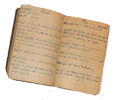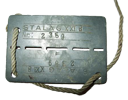Taken Prisoner at Hazebrouk
The Germans who overran us were the crack storm troops, the cream of the German Army. They treated us quite well, on the whole. They gave us some soup and bread and treated any who wanted medical treatment. There were some in Red Cross trucks though who were wounded, and if looks could kill we would have died on the spot. After a while they took us further back, in trucks and handed us over to a camp where there were hundreds more British and French P.O.W.s. The French looked as if they had come prepared with many having suitcases or kitbags packed with food and clothing; there was a very bad feeling between us. I hadn’t got anything to put the stew in that they were dishing out but after hunting around I found an empty pear tin, which I used. It had to do for the coffee as well, as I couldn’t find anything else. We slept in the fields ringed by armed guards. It was a bit of a shambles but the weather was kind to us and stayed dry.
On the 28th of May we woke up at 3:00 am and had two biscuits and a drink of coffee (well they said it was coffee) and were marched to Doullens. What a march; there were hundreds and hundreds of prisoners and the column seemed to stretch into the distance in front and behind. I can’t really describe how we felt – just very weary and very demoralised. We were issued with half a tin of stew at 9:30 pm after waiting since 5:00 pm for it. We slept, that night, in an old prison.
We marched all the next day and got another half a tin of stew and three biscuits at 8:00 pm. We passed thousands of refugees on the road and it was heartbreaking to see the state some of them were in and the way the Germans treated them.
On the 30th of May we were up at 5:00 am. There was no food and I passed out for a few minutes before we started marching again. I guess it was down to lack of food and exhaustion. We marched for the rest of the day and into the night. At 12:30 am on the 31st we were given a loaf of bread between six men and a tin of watery stew. My feet were in a hell of a state by now, swollen and bleeding. I had to cut the sides of my boots to get them on.
The guards we had now were a lot different from the ones who had captured us. They had treated us as fighting men and with a certain respect. The new ones, though, were very arrogant and abused us all the time. They were always shouting “Los Los Schnell” which means, roughly “get a move on quickly”. These were the first words that we got to know.
I met two of my mates, John Matheson and John Bedford. We were up again at 6:30 am on the 31st. I had a drop of stew in my tin and a loaf of bread between six men. I don’t know what their bread was made from but it tasted like sawdust (about the size of one of our small tin loaves) and the stew was watery stuff with nothing much in it – more like cabbage water.
We arrived outside Cambrai at 6:45 pm but there was no more food. Thousands of prisoners were there, including French and Belgians. They seemed to get all the grub; we didn’t get any. I went to Cambrai on the 3rd of June with a small party to clear the station. I managed to get some jam and dripping that I pinched from a store. Back at the camp it was a meal of stew and six to a loaf – plus the jam and dripping that I shared with the two Johns. While eating what we had I heard my name called out and much to my astonishment a chap came up to me called Joe Kerr. He was a friend of my brother Syd, who lived across the road from us at home; he was in the Tank Corps. We exchanged a quick greeting and then he dashed off to try to get something to eat, saying he would see me later but I never saw him again.
I have no idea of how many miles we covered during the days on that march. Several of our men were shot for either not moving quickly enough for them or loosing their temper and shouting back at the guards; that was fatal. In our weak state it was hell. We were all feeling very low in spirits still and couldn’t march in step but just kept going as best we could, putting one foot in front of the other. They always said “Only another two kilometres” but it stretched on and on. We were in a perpetual, stupefied daze; our only thought was that we had to keep going.
The next day we left Cambrai station crammed into cattle trucks, seventy men to a truck. We were locked in and there was only one tiny barred window in each corner. We had no food at all. It was terrible in those trucks; there was no room to move about, much less lie down and we had to stay in the one spot all the time. That night was pure hell. Every so often someone would shout “Where’s the bucket?” and it would be passed over our heads to the person, he would use it, and back it would go over our heads to the window to be emptied if possible. More often than not more came back in than went out. It’s just impossible to describe what it was like in there. They let us out in the morning, before we got to the station. There was a quick dash to the edge of the embankment, row upon row of bare bottoms and then back on the train.
We stopped at a station in Belgium and had a slice of bread at 6:30 pm. We moved off again at 8:00 pm. without getting off. We tried to get a bit more organised that night. Half of the men crammed tighter at one end of the truck (if that were possible) and the other half tried to lay down and get some sleep. Even the there were six or seven pairs of legs on top of yours. You would struggle to get yours on top, get some sleep, and then wake up to find your legs numb and at the bottom again. That went on until it was time for the other half to have a go. I don’t think it was much better - I do know I didn’t get much sleep – and the bucket was in use all night long. By now the atmosphere in there was pretty high, to put it mildly. We stopped at a place for about three hours. It was near a town or a station but I don’t know where. There was an air raid and the chap by the window was trying to peer out of it and give a running commentary of what was happening. We didn’t feel very safe in that confined space. It was a very slow journey, with lots of stops, but they never let us out once.
At 8:00 pm on the 6th of June we arrived at Trier, on the German/Luxembourg border, and were marched two miles to a prison camp. We were given a loaf of bread between six men and a piece of cheese at 11:00 pm. When we divided the bread up between us, one chap cut it up into as equal portions as he could (with all the others watching him like a hawk). He then put them under cover, held one portion, called out “Who’s for this piece?” Someone would say “me” and so it went on until everyone had had his share. It was the fairest way as no one could say that someone had had a bigger piece than he had. It was the luck of the draw; the system worked very well and was used all the time I was there when there were things to share.
The next day I was up at 6:30 am. I had a tin of coffee and then lined up and waited six hours for bread and jam which we never got. We lined up again for tea at 8:00 pm and still didn’t get any. At 9:15 pm we were marched off to the station at Trier and crammed into cattle trucks again. (Still 70 men to a truck.) At 11:00 am the next day we stopped and were given a piece of bread and a bowl of soup by the German Red Cross. That was the best meal since we had been captured. I tried to keep the bowl but they were watching too closely.
9th June. The previous day and night on the train had been terrible; it was only stopped once to let us out and line the embankment to stretch our legs etc. Two of the men were very sick, although we were all feeling pretty rough. If you can imagine seventy men crammed tight in there, the weather was very hot, there wasn’t a lot of air and the stink was unbearable. It was hell.
We arrived at Schubin in Poland at 8:00 pm. We scrambled out and then marched about two miles (it seemed like twenty) to a Stalag. John and I helped a sick man all the way, with us holding him up as he walked between us. Some Polish women gave us coffee and bread on the way and, for a change, the guards allowed them to. The country was flat, which was a blessing I suppose as at least we didn’t have any hills to climb. It was very dusty and hot and I felt very dirty. What wouldn’t I have given for a nice hot bath? The Polish women we met tried to talk to us but I haven’t a clue what they said. They didn’t look very happy or very well off; I don’t think they could afford to give us what they did but they seemed to be pleased to do so and we appreciated it very much.

